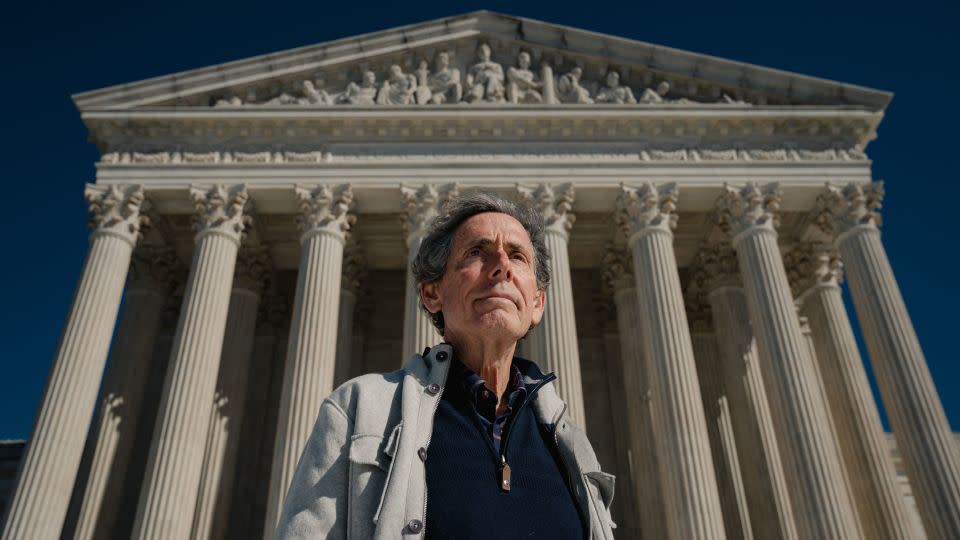Smithsonian museum says its Latino-focused internship is open to students of all races in lawsuit settlement
- Oops!Something went wrong.Please try again later.
A Latino-focused internship program at the Smithsonian’s National Museum of the American Latino now states the program is “equally open to students of all races and ethnicities” following a lawsuit settlement with the American Alliance for Equal Rights.
The internship was the subject of a lawsuit against the director of the National Museum of the American Latino and the director of the Institute of Museum and Library Services filed last month by the alliance – which is led by legal strategist Edward Blum, who was also behind the Supreme Court case that dismantled affirmative action in college admissions.
The lawsuit claimed the Smithsonian’s Latino Museum Studies Program undergraduate internship violated the US Constitution by discriminating based on race and ethnicity, stating the program hadn’t hired any non-Latino interns in the two years it operated — 2022 and 2023.
“When the Alliance sued, the Museum said the internship was ‘for Latina, Latino, and Latinx-identifying undergraduate students’ and focused on ‘increasing the representation of Latina and Latino museum professionals,’” the American Alliance for Equal Rights said in a statement Wednesday.
But according to the settlement, the defendants submitted a brief in response to the lawsuit stating the National Museum of the American Latino “does not consider an applicant’s race or ethnicity as a factor for awarding an internship” and it “does not collect data on race or ethnicity from the Internship Program applicants.”
The internship program’s website now says in bold: “The Undergraduate Internship is equally open to students of all races and ethnicities, without preference or restriction based on race or ethnicity. The Museum does not use racial or ethnic classifications or preferences in selecting awardees for the Undergraduate Internship.”
The program has also agreed to add language to its scoring rubric saying the internship “is equally open to students of all races and ethnicities. Reviewers should not give preference or restrict selection based on race or ethnicity,” according to the settlement.

“Every student who is interested in this area of museum studies should have the opportunity to compete for an internship without their race being a factor,” Blum said in the statement. “Corporations, law firms, academia, and cultural institutions must end these kinds of unlawful, racially exclusive programs and policies.”
The language added to the program’s website and scoring rubric as part of the settlement “spells out what had been our practice already,” David Coronado, a spokesperson for the National Museum of the American Latino said in an email to CNN.
“The National Museum of the American Latino reaffirmed its longstanding commitment to equal opportunity for all internship applicants, regardless of race or ethnicity,” Coronado said.
The Smithsonian lawsuit was among several legal challenges Blum filed since the Supreme Court case that gutted affirmative action. Last month, the Supreme Court rejected a request from Blum’s group, Students for Fair Admissions, to temporarily block the US Military Academy at West Point from race-conscious admissions, CNN previously reported.
Blum is currently in a legal battle with the Fearless Fund, a Black women-owned venture capitalist fund, over its grant program that offers funding exclusively to Black women entrepreneurs. In August, Blum also sued two international law firms over their diversity fellowships, but he later dropped one of the lawsuits after the firm decided to open its fellowship to all associates.
The lawsuits come amid a string of attacks against diversity, equity and inclusion (DEI) programs in corporate America, schools and higher education in recent months.
Black business leaders and DEI experts have told CNN Blum’s lawsuits stand to undo decades of progress toward leveling the playing field for Black and brown people in various job fields. DEI programs, they say, are being created to foster safer, more inclusive work environments for people of all races, genders, sexual orientations and religious identities.
CORRECTION: A previous version of this story gave the wrong first name for a spokesperson for the National Museum of the American Latino. It is David Coronado.
For more CNN news and newsletters create an account at CNN.com
